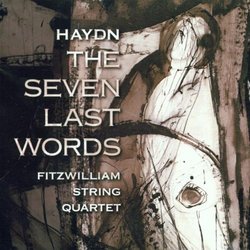| All Artists: Fitzwilliam String Quartet Title: Haydn: The Seven Last Words Members Wishing: 0 Total Copies: 0 Label: Linn Records Original Release Date: 1/1/2001 Re-Release Date: 6/5/2001 Genre: Classical Styles: Chamber Music, Historical Periods, Classical (c.1770-1830) Number of Discs: 1 SwapaCD Credits: 1 UPC: 691062015325 |
Search - Fitzwilliam String Quartet :: Haydn: The Seven Last Words
 | Fitzwilliam String Quartet Haydn: The Seven Last Words Genre: Classical
|
Larger Image |
CD Details |
CD ReviewsReach for Your Credit Cards... Giordano Bruno | Wherever I am, I am. | 05/21/2008 (5 out of 5 stars) "...friends, because you've got to have this one! Breath-taking performance, ear-pleasing audio, heart-soothing music!
The Fitzwilliam Quartet was founded in 1968 by undergraduate students at Cambridge, England. Dmitri Shostakovich was so impressed by their playing that he assigned them the westerm premieres of his last three quartets. They became the first quartet to record the whole cycle of Shostakovich's quartets. (I've just discovered, by the way, the bargain of the century: the used price for the full Shostakovich by Fitzwilliam is less than $7.00) Time passed, the quartet went through changes, disbanded for a bit, and then was reconstituted with two of the older players joined by two much younger. They now perform on both modern and original classical strings. This Haydn is done with the latter. Haydn wrote the first version of The Seven Last Words in the form of purely orchestral interludes for a traditional Easter service in the Cathedral of Cadiz, in 1785. Two years later, he published two versions of that music for popular consumption, one for piano and this one for string quartet. Wait! Think of it: a unified 62 minute composition for string quartet, decades before Beethoven wrote anything of such scope! And it is unified, carefully crafted through its nine movements to evolve through moods of reflection on the Christian mystery, both musical and emotional moods. The only movement that departs from slow and quiet is the brief, violent finale depicting the Earthquake and Rending of the Temple. Yes, it's quiet, soulful music, not so much somber as poignant, but Haydn's contrivance is so varied that boredom is not a possibility. This is not only the best quartet performance; it's the only acceptable one. The Fitzwilliams make it sing, sigh, and sob with their limpid gut-string tone. Haydn later recast the whole composition as an oratorio for orchestra, chorus, and soloists. There are two outstanding CDs of that work, one conducted by John Eliot Gardiner and the other featuring soprano Sandrine Piau with the Berlin Akademie fur Alte Musik. The quartet version is still my first choice; if I were religious, it would express my deepest feelings." |

 Track Listings (9) - Disc #1
Track Listings (9) - Disc #1